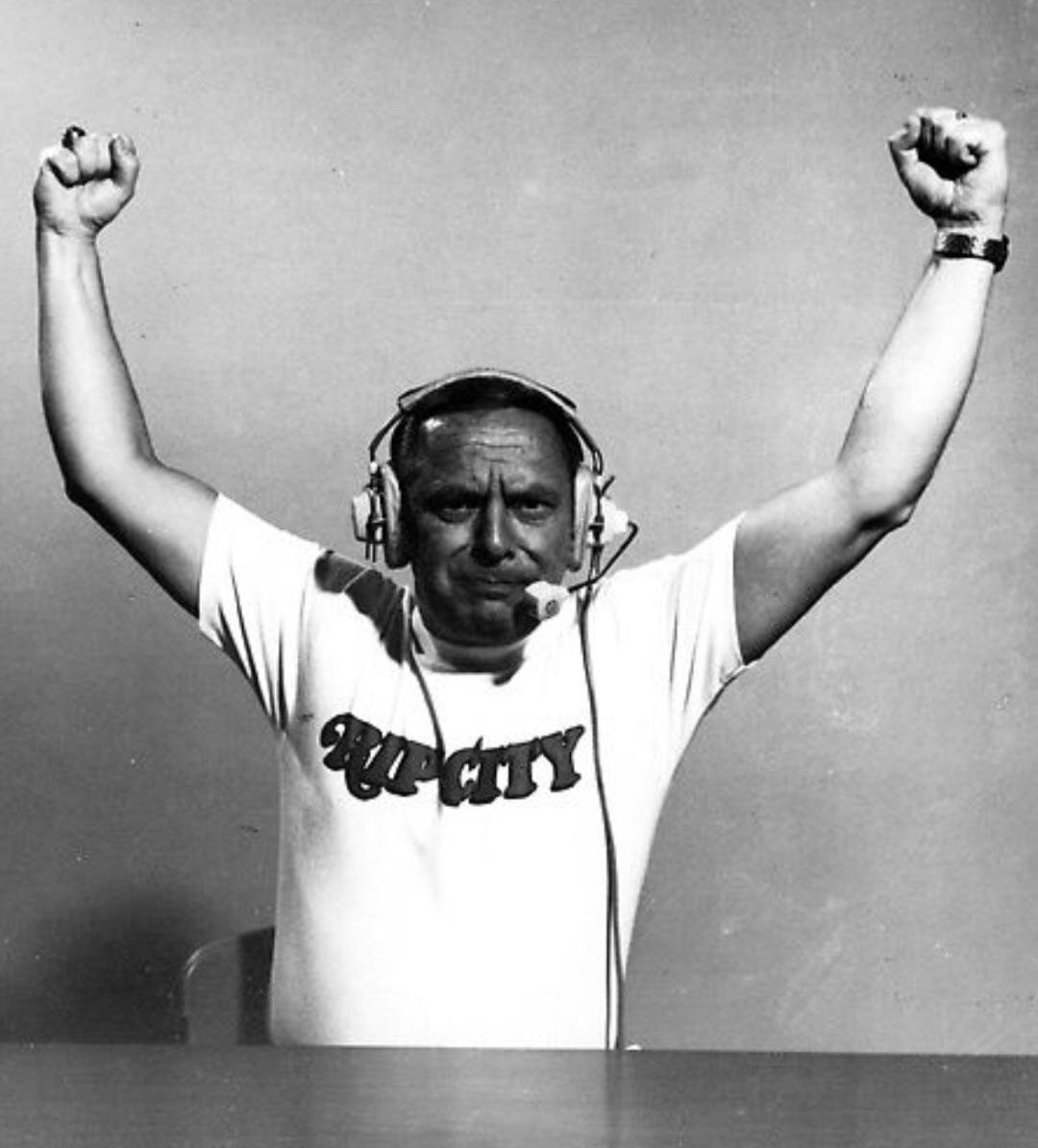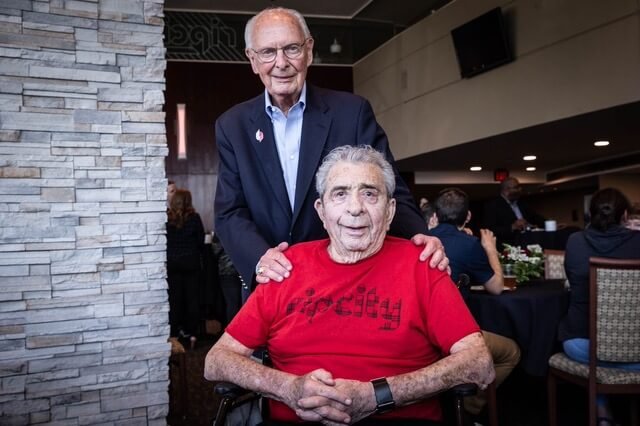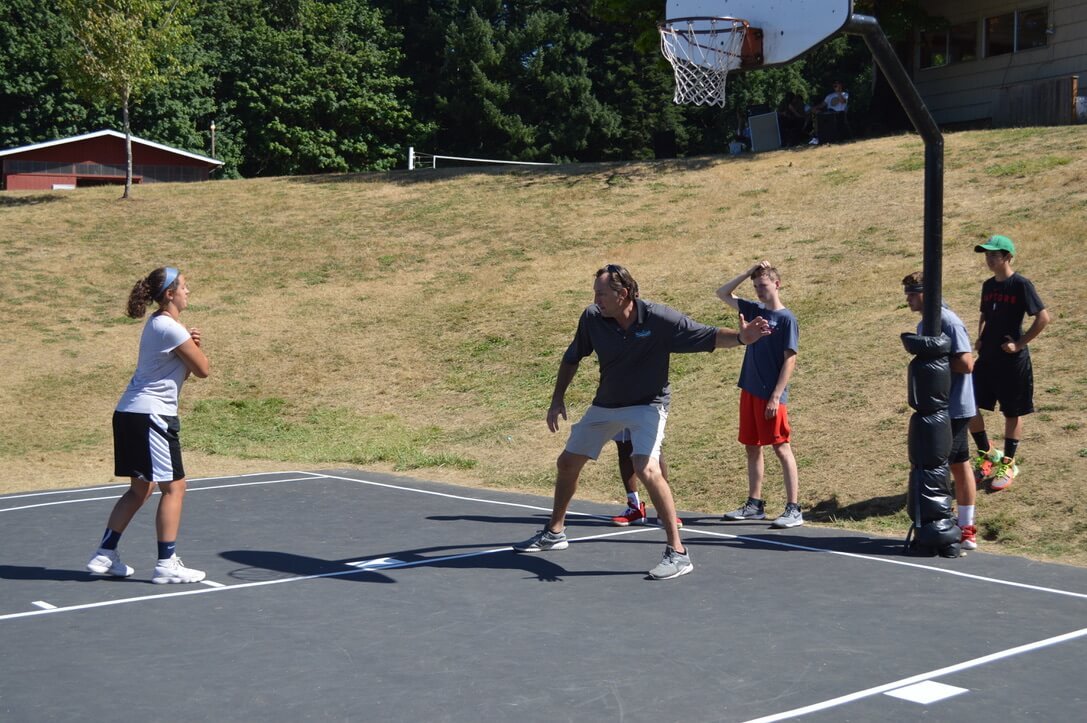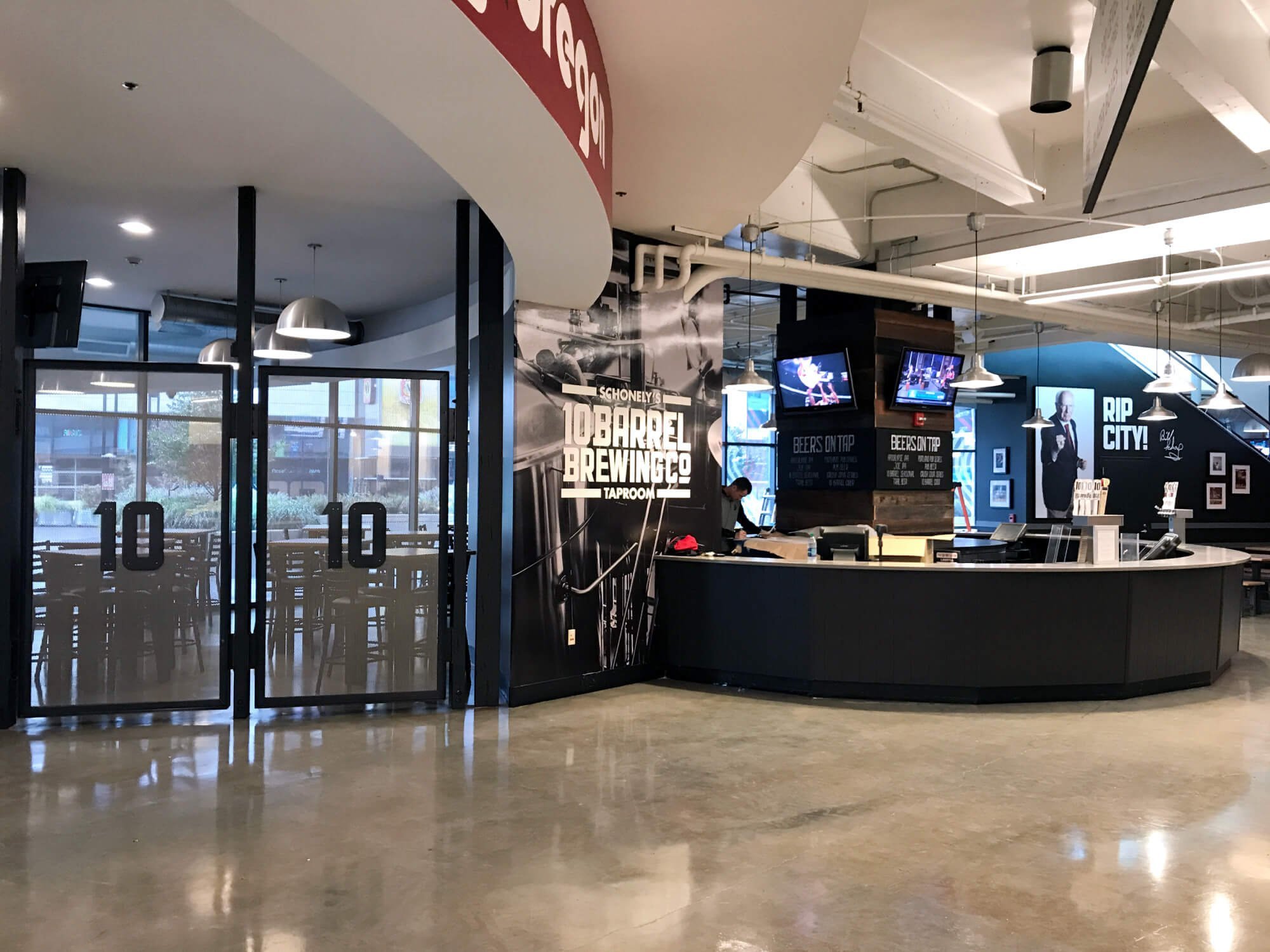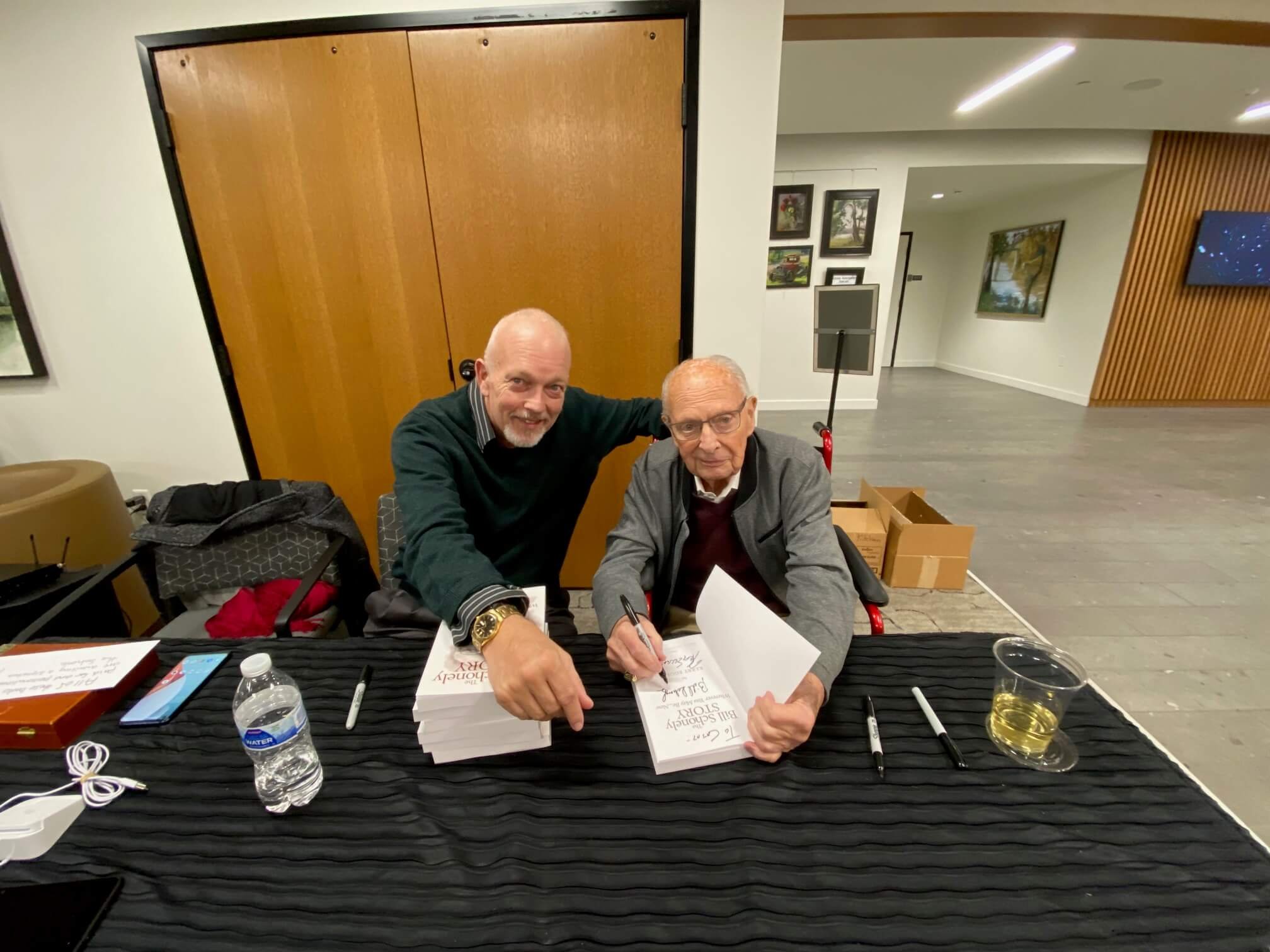The Schonz finally climbs the golden ladder. What a ride it was
If there were any doubt about the impact Bill Schonely had on those around him, check out the world of social media on Saturday.
Hundreds of Tweets (here and here) and Facebook posts (here) extolled the virtues and mourned the loss of the legendary Trail Blazers broadcaster, who died Saturday at his Lake Oswego home at age 93.
The reaction was similar in the tight brotherhood of those who worked and played for the Blazers during Schonely’s time which, really, was pretty much all the time since that first game on October 16, 1970.
The Schonz was the man, any way you phrase it.
“The most consistent connection to the Trail Blazer community? Bill Schonely,” says Larry Steele, a member of the 1977 NBA championship team. “Hands down. There’s no second place. He far and away has been not only the voice of the Trail Blazers, but also the emotional voice of the entire organization.”
“Probably the most recognizable Blazer ever,” says Bob Gross, another ’77 team alum. “He was the best of the best.”
Bob Gross, member of the 1976-1977 Portland Trail Blazers NBA Championship team
“I would put Bill No. 1 in importance in Blazer history,” says Jon Spoelstra, who served as the club’s executive vice president/general manager for a decade (1979-89). “From a fan’s perspective, he was the uniting spirit for the franchise. He is Portland Trail Blazers basketball.”
Jon Spoelstra
“The Schonz was an Oregon institution,” says Marshall Glickman, the former Blazer president/GM and son of franchise patriarch Harry Glickman. “Bringing Bill to Portland in 1970 was the best decision my father ever made. Bill transcended basketball and the Blazers to reach iconic status, not only in Oregon, but across the basketball universe.”
Schonely and Harry Glickman
“Schonz has had as much impact on the state of Oregon as anybody, ever,” says Chris Dudley, the former Blazer center who was an Oregon gubernatorial candidate in 2010.
“Bill is the most important Blazer of us all,” says Bill Walton, the lanky, loquacious former Blazer great. “From the beginning, he made people believe that what (the Blazers) were doing was worth their interest, their attention, their commitment and their loyalty. Those were all human elements that Bill Schonely had in boundless abundance.”
► ◄
Jim Barnett, an original Portland Trail Blazer
Jim Barnett was an original Blazer, and the former Oregon Duck wound up being the inspiration of Schonely’s “Rip City” that has become a nickname and symbol for the city of Portland.
Schonely had heard the “Rip City” during his time calling baseball. During that first Trail Blazer season, in a game against the Los Angeles Lakers at Memorial Coliseum, Barnett nailed a howitzer to push Portland in front.
“Rip City!” Schonely exclaimed, and the quintessential Portland phrase was born.
“It’s a great honor that will always be with me, and it means more and more as time goes on,” says Barnett, 78, now radio analyst for the Golden State Warriors. “It means even more now with the death of Bill Schonely. When it’s my time to go on — I’m in the fourth quarter — that will be mentioned. My obituary won’t omit that, particularly in Portland. Rip City will be on my epitaph.”
Cheri Hanson, the Blazers’ vice president/team relations and a Blazer presence for almost as long as Schonely, helped arrange for visits from several notables as the broadcasting legend’s days counted down. Steele, Bob Gross and Lloyd Neal — all ’77 team alums — came together to pay their respects.
“I was thankful we had an opportunity to spend some time with him,” Steele says. And he had a good visit with Bill’s wife, Dottie. It was a time to reminisce about some of the things Steele liked about the Schonz.
Larry Steele, member of 1976-1977 Portland Trail Blazers NBA Championship team
“Bill always had time for everyone,” he says. “He had this authentic, genuine caring for other people. He demonstrated that nightly in every broadcast he did. It was talking about the team, showing that love for the players and the emotions you go through when you care about someone — and in this case, a group of people that he wanted to be successful.”
Steele laughs as he mentions how he didn’t have to know the game’s score when listening to a Schonely broadcast.
“You only had to listen to the inflection of his voice for 10 to 15 seconds and you knew how the team was playing,” Steele says. “His sadness or jubilation was in lockstep with how the team was doing — and that included missed free throws.
“Through his career, Bill was by far the greatest representative of the team on a yearly basis. Different players, different owners, different coaches … Schonz was the constant.”
“He was consistent for 50 years,” Gross seconds. “He was the voice that people heard and identified with.”
Gross’ first impression of Schonely upon joining the Blazers in 1975 was not the same opinion he would eventually have.
“He was good at what he did,” Gross says. “People who are really good at what they do usually have an ego. That was my impression of Bill. I got to know him a lot better after I was done playing. We played some golf together and became much better friends. He was actually very humble.”
Gross had the same experience I did, and probably others, especially during Schonely’s latter years.
“People would come up to talk to him, and he was very gracious to them,” Gross says. “He always made people feel like he knew who they were. And then they’d be on their way and he’d ask me, ‘Who was that?’
“We would meet up before games in the sponsors suite at Moda Center. We’d sit and talk for awhile, and then he’d be off do his thing. ‘Shaking hands and kissing babies,’ he’d say. He is going to be missed by everybody.”
► ◄
Darnell Valentine and Dudley are Blazers of later eras — Valentine in the 1980s, Dudley in the ‘90s.
Darnell Valentine with daughter Tierra (left) and wife Cindy (courtesy Darnell Valentine)
Valentine, who lives in Portland, served 11 years as a regional representative to the NBA Players Association (1994-2004), so he was around the Blazers a lot after his playing days were over.
“Bill was 93,” Valentine marvels. “He lived a full and vibrant life. Words can’t possibly explain his brilliance and what he has meant to the Blazer organization.”
Schonely served as ambassador for the Blazers from 2003-2022. Valentine often ran into him at Moda Center.
“Being an ambassador requires energy,” Valentine says. “To create enthusiasm requires energy. This dude always had more energy than I did. I’d ask, ‘What’s your secret?’
“And earlier in his career, when he was still calling games, he brought energy. He had an unrelenting passion for what he did. He had love for the players, the game, the organization. It was unmatched.”
Valentine mentions another thing that has crossed my mind in recent weeks, as I noted Schonely beginning to fail. Since 2008, he conducted public memorial services for former Blazers Kevin Duckworth, Jerome Kersey, Dale Schlueter and Cliff Robinson.
“He has done so many eulogies for players,” Valentine says. “You could put all those eulogies and package them up and do a compilation and you might get close to expressing how profound Schonely’s influence was in Portland.”
Dudley drove from his home in Bend to spend some time with Schonely two weeks ago.
Portland Trail Blazer alum and Bend resident Chris Dudley (courtesy of the Chris Dudley Foundation)
“It was awesome,” he says. “He was alert, good spirits. We had a great talk.”
During the talk, Dudley related one of his favorite quotes, this one from Jackie Robinson: “A life is not important except in the impact it has on other lives.”
Dudley has a charitable foundation and runs an annual juvenile diabetes camp in Vernonia.
“Whenever I’d call him to speak at anything for my foundation, for charity, for anything, he’d say, ‘I’ll be there,’ ” Dudley says. “He was such a giving person. He and Dottie sang in our church choir in Lake Oswego. (Wife) Chris and I feel fortunate to have been around them.”
The Dudleys’ son, Charles, liked to tell the Schonz how much he enjoyed the “Schonely burger” on the menu at Schonely’s Taproom at Moda Center.
Schonely's Taproom at the Moda Center
“He always laughed,” Dudley says. “Just a class act, a gentleman in every way. He meant so much to the city and the state. He impacted so many people.”
► ◄
Schonely made a positive impression on many of his bosses, among them Spoelstra, Marshall Glickman, Chris McGowan and Geoff Petrie.
“When we were working together, we were close,” Spoelstra says. “He was a terrific broadcaster. I loved working with him.
“Some announcers can become prima donnas. Schonely wasn’t that. When you’re working with him, it was like working with a real person. That was unusual for that job.”
Schonely had a penchant for counting Blazer turnovers.
“After a game, he’d say something like, ‘Blazers had 17 turnovers tonight,’ ” Spoelstra says. “And the opponent might have had 20, but he wasn’t going to mention that. I told him, ‘I’m going to put a guy up on the roof with a high-powered rifle, and when you start counting turnovers, he’s going to take you down.’
“We used to laugh about that. I loved listening to him. He was exciting. You wanted to keep on listening, right on til he gives the score right at the end. He is Portland Trail Blazer basketball.”
During the Spoelstra era, Blazer Broadcasting televised about 20 games a year. Radio was the only choice for the other 62. That helped make Schonely the man with so many fans of the Blazers.
“Schonz set up the original network of six stations,” Spoelstra says. “At our height, we had 42 in four states, and three 50-watt stations. Think about how many kids grew up listening to Trail Blazer basketball.”
Glickman grew up listening to Schonely, and later became his boss.
Former Trail Blazers president Marshall Glickman
“There are many broadcasting legends, but nobody had better pipes than The Schonz,” says Glickman, now CEO of EuroLeague Basketball and living in Spain. “Nobody came up with such unique phrases — ‘Climb the golden ladder,’ ‘lickety brindle up the middle,’ ‘bingo, bango, bongo’ and, of course, ‘Rip City.’
“Schonz was affable. Loyal. Kind. Human. A wonderful husband to Dottie. Schonz was and always will be Portland, Oregon.”
Chris McGowan served as the Blazers’ president/CEO for almost 10 years (2012-21), so he missed Schonely’s play-by-play years. But he caught him as a broadcaster emeritus and the best ambassador an NBA team could have.
“We developed a strong relationship over the course of my 10 years in Portland,” says McGowan, now president/CEO of Ilitch Sports in Detroit. “I value that very much to this day. He was a great person who meant a lot to the organization. He did a lot for me personally. He did a lot for the community.
“Biggest thing was, he loved the Blazers. We were so incredibly lucky to have him. He put so much time and energy into it. He helped us with sponsors. He was great with fans. He did everything. It was a pleasure to work with him.”
Petrie had an unusual relationship with Schonely. They met in 1970 when Schonz was the radio guy and Petrie the No. 1 draft pick and prize rookie guard. The friendship grew, and in 1991 Petrie served as best man in Bill and Dottie’s wedding. Geoff respects Schonely as the last vestige of the old guard.
One of the original Portland Trail Blazers, Geoff Petrie
“I came to the organization and left and came back again, but Schonz was always there,” says Petrie, who wound up as Portland’s executive vice president/GM in the early ‘90s. “Now they’re all gone — Harry Glickman and Berlyn Hodges and Schonz.”
Petrie has daughters, a sister and grandchildren living in the Portland area, so last week he went to see Schonely along with former Blazer guard (and newly named ambassador) Terry Porter.
“We spent an hour and 15 or 20 minutes with him,” Petrie says. “It was a good visit. He was mentally very aware and conversational to a point talking about memories. He was really down about the fact he couldn’t do anything. We had a bunch of laughs, but you could see his quality of life was not going to come back.”
Before he ascended to a management position, Petrie served as Schonely’s radio analyst.
From left, ex-Oregon State and NBA guard Mark Radford and ex-Blazers Greg Smith, Geoff Petrie, Michael Holton, Bob Gross and Michael Harper flank Schonely
“Three incredible years working with him,” Petrie says. “He knew all the franchise history leading up to that. He helped me a lot as far as speaking and communicating and things to do and not to do on the radio. During that time, I was also doing a little bit of skills (coaching) for Mike Schuler with the players. Sometimes if I didn’t want to go to the coaches meetings, I’d tell Mike, ‘I got a broadcast meeting with Schonz.’ ”
During his years calling play-by-play, Schonely wound up the butt of many gags by coaches and players. Chief tormentors: Jack Ramsay and trainer Ron Culp. Schonz took it well, though. It made him one of the guys. And on some occasions, he was able to give as well as get.
Schonely signs autographs during a book event at Moda Center (courtesy KJ Maduike)
“Guys used to kid him a lot at times,” Petrie says. “He had some of those personality quirks, but it was all in fun. He got as many laughs out of it as we did.”
Petrie relished a chance to work alongside Schonely in his prime.
“He was like all the great announcers,” he says. “He had a style, a shtick, a great voice, and plenty of enthusiasm. He had a performer’s personality. He was in his element during a broadcast. He was always ready to go out and put on a show. He took on that project with a larger than life personality.
“And always, he loved the Blazers. He loved that team. I’m glad he’s in a place where they don’t miss free throws and they don’t turn the ball over.”
► ◄
Dave Twardzik, member of the 1976-177 NBA Champion Portland Trail Blazers team
Dave Twardzik was another tormentor, but he did it sitting alongside Schonely in the broadcast booth. Twardzik, point guard on the ’77 championship team, was Schonely’s analyst for five years.
Nobody was better at kidding Schonely on the air.
“Schonz was a little bit like Ted Knight on the Mary Tyler Moore show,” says Twardzik, still serving as radio analyst for his alma mater, Old Dominion. “There was some vanity in there. You had to call that out at times.”
Twardzik FaceTimed with Schonely a week before he died.
“He was very lucid, but you could tell he was tired,” Twardzik says. “He had been fighting a tough battle. But Schonz was Schonz. He was curmudgeonly, and I mean that in a complimentary way.”
They had this conversation:
Schonely: “David, I’ll never forget that line you used on me.”
Twardzik: “What was that?”
Schonely: “I was describing the action during a game and you said, ‘Schonz, what game are you watching? It’s not that interesting.’ ”
Twardzik admired Schonely’s craft.
“He was exceptional,” he says. “He was incredible at making a rather mundane game seem very interesting on the radio. He led a very interesting life and he made life interesting for a lot of listeners in Portland.”
► ◄
Bill Walton, member of the 1976-1977 Portland Trail Blazers NBA Championship team, Naismith Memorial Basketball Hall of Fame member
Walton was Schonely’s favorite Blazer player. Walton, through the years, has made it known that the strong feelings are reciprocal.
“I had the privilege of knowing Bill in every way imaginable, but mostly as a friend,” Walton begins. “He was our broadcaster, the face of our team, but he was also your friend. A friend in the way your coach could not be your friend. The coach is not supposed to be your friend. He transcended all avenues of our lives, and he was the head of the family.
“Bill was an eternal radiant mass of energy, hope, optimism, joy, goodness and kindness. Bill represents not only the best of the Trail Blazers and the NBA, he represents the best of everything. The best of life, the best of our nation, the best of humanity. He was a remarkably special and unique individual who gave his life to make other people happy. He is the face and the spirit and heart of the franchise.”
Walton recalled the early years of the Blazers, when Schonely would take an individual player — maybe Gross or Lionel Hollins or Twardzik or Gross or Maurice Lucas — on a summer caravan to rural Oregon.
“None of us ever turned down a request from Bill,” Walton says. “We’d drive to Bend or Astoria or Pendleton.
We would just be friends in the car. Bill would get us there. We would get to the event and Bill had organized it for us to meet with advertisers, sponsors and civic leaders. And Bill would put the show on. It was great to be a part of it.”
Walton was in Springfield, Mass., when Schonely was presented the Curt Gowdy Award during the 2012 Naismith Basketball Hall of Fame induction ceremony.
“I was there and got to be a part of that,” Walton says. “That was the same class that had Phil Knight in it. To have Phil be in the same class was absolutely fitting.”
Walton flew to Portland to see Schonely on Friday, Jan. 13.
“I was super glad I could make some adjustments in my schedule and everything worked out,” he says. “I was able to spend time with Bill and Dottie. When I first got there, Bill was in a chair and Dottie was right next to him. And I played a song for them.”
The song is entitled “I’ll Remember You.” It was written by Bob Dylan. It was sung by Thea Gilmore.
“A powerfully emotional song,” Walton says.
Its final verse:
“I’ll remember you.
When the wind blows through the piny wood
It was you who came through
It was you who understood
Though I’d never say
That I done it the way
That you’d have liked me to
In the end
My dear sweet friend
I’ll remember you.”
“And when it was over,” Walton says, “I held Bill’s hand and I thanked him for everything he’s done for all of us.”
► ◄
Schonz and I were friends, not bosom buddies. I wrote his biography in 1999, and we talked often but didn’t socialize much through the years. In recent years, we spent some time together, going to lunch or just talking on the phone. I like to think I looked out for him a little as he grew old, but he was plenty capable of taking care of himself.
On Oct. 3, he underwent hip replacement surgery. He had constant pain in the hip, and I was glad — even at his age — that he was having the operation. But the pain never fully subsided. And soon other problems arose. A leg swelled, evidently a reaction to medication. There were potential heart and kidney issues. At first, he used a walker to get around. Then a wheelchair.
We had scheduled four book signing events in December for our new book, “Wherever You May Be … Now, the Bill Schonely Story.” He was able to fulfill the ones at Moda Center and at Charbonneau, the latter the Schonelys’ residence for nearly 20 years. The other two, he just didn’t feel up to it, and we canceled.
Schonely’s final book signing event at Charbonneau
Over the last couple of weeks, he was mostly bedridden. He was sharp mentally but very tired. He asked me twice to bring a small load of books for him to sign, and he did it — the last few on Friday.
We talked for a bit after he signed them. He hadn’t stayed up for the second half of the Blazers’ loss to Philadelphia the night before. I filled him in. It was almost noon, and I said I had to go, and I’d try to stop by and see him on Monday.
Little more than 12 hours later, he was gone.
But I look at it this way:
Schonely lived 93 good years. All of his contemporaries are gone. In 1981, he suffered a heart attack that could have been fatal. From that point, he was playing with house money.
The Schonz’s chips were finally cashed in on Saturday, as good a bet as a general manager ever laid down on a broadcaster. Harry Glickman came out rolling sevens.
The voice of God has been silenced. But it won’t be forgotten.
“Bill Schonely was one of a kind,” Valentine says. “There will be other broadcasters, but no one will be able to fill those shoes. Never, ever.”
► ◄
Readers: what are your thoughts? I would love to hear them in the comments below. On the comments entry screen, only your name is required, your email address and website are optional, and may be left blank.
Follow me on Twitter.
Like me on Facebook.
Find me on Instagram.
Be sure to sign up for my emails.
